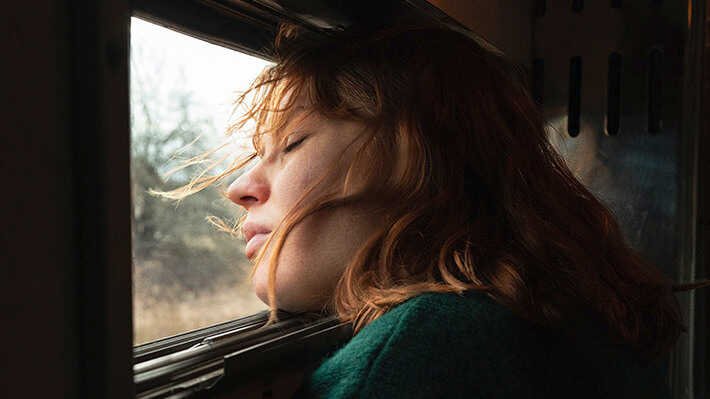Directed by: Juho Kuosmanen
Written by: Juho Kuosmanen, Andris Feldmanis, Livia Ulman, and Lyubov Mulmenko, based on Rosa Liksom’s novel
Starring: Seidi Haarla, Yuriy Borisov, and Dinara Drukarova
Runtime: 107 minutes
‘Compartment No. 6’ offers a winning cinematic journey
“No spitting on the floor.”
A train conductor warns Laura (Seidi Haarla) – a Finnish woman studying in Moscow - about this spewing statute as she boards a train. Good to know because Laura was about to reach for a pinch of chewing tobacco.
No, not really.
However, this 30-something is heading on a 1,200-mile journey (almost due north) from Moscow to Murmansk. By car, the trip would take 23 ½ hours straight, but this railway carriage makes stops along the way, including an overnight in Petrozavodsk, and she has to share quarters with a stranger, Ljoha (Yuriy Borisov), for a couple of days.
Now, he – about her age - doesn’t chew Skoal or the popular Russian brand, Siberia. Still, Ljoha smokes and drinks constantly, and since Laura is traveling alone, he inquires if she’s a prostitute.
Nice.
Via first impressions, Ljoha has all the charm of Veruca Salt, and clearly, Laura hasn’t won a golden ticket.
Despite Laura and Ljoha meeting on a train, director Juho Kuosmanen’s movie doesn’t resemble Richard Linklater’s “Before Sunrise” (1995), the romance picture that kicked off the “Before” trilogy with Jesse (Ethan Hawke) and Celine (Julie Delpy).
The accommodations in this film are sans frills, as they travel without creature comforts during a frosty Russian winter.
The blustery, snowy weather outside their window begs for emotional huddling and commiserating inside. However, thin sheet metal walls are everywhere, and no, the second-class abodes aren’t as uncomfortable as sardine cans, but living conditions are cramped, and the overall ambiance lacks style points.
The unassuming confines are all by design in “Compartment No. 6”, adapted from Rosa Liksom’s novel, an intriguing story about an educated woman feeling emotionally insecure in her current romantic relationship. Laura also finds herself lost within her confined traveling space while looking out towards hundreds of vast, inhospitable miles.
Kuosmanen, Andris Feldmanis, Livia Ulman, and Lyubov Mulmenko penned the adapted screenplay from Laura’s perspective and expertly establish her character during the opening few minutes. She attends a party in a spacious flat filled with intellectuals, professors, and their spouses, and everyone seems to enjoy plush and playful conversations. We soon discover that Irina (Dinara Drukarova) – the hostess and a university faculty member - is Laura’s girlfriend. Irina is older, established in her career, and wields power within these pleasant, elegant surroundings.
Earlier at the get-together, someone referred to Laura as Irina’s lodger, meaning that the said person didn’t know how to characterize their lesbian relationship or didn’t realize that the two women were in one. Probably the latter because it seems that Irina doesn’t advertise that she and Laura are lovers.
The next day, Laura leaves for the station alone. The two were supposed to travel to Murmansk - located almost on the Barents Sea, near Finland’s border – but Irina cancels due to work. So, Laura takes tentative steps on an unsure trek, but this redhead dons a heavy green sweater and a thick powder-blue polyester coat to pacify her discomfort and cope with the bitter cold.
Set in the 1980s or 1990s (and Liksom’s novel clocks in during the mid-80s), you won’t find iPhones, Google maps, or social media here, so immediate time and space are defined through earshot and eyeshot. Laura has to bend to the train schedule’s mercy and forced discourse with her unrefined cohort. She’s out of her comfort zone and stuck with her boorish new comrade, but Ljoha is more than calls for frequent drinks and gruff, frank talk.
This thin fella with a shaved head and modest clothing doesn’t reveal anything from his past, but Laura and we gather that life has regularly dealt his cards from the bottom of the deck. Ljoha has coped with loss and rejection, or perhaps he hasn’t thought enough of himself to take bold leaps that could lead to those aforementioned feelings. Regardless, he’s suffered through bad beats, but there’s a good-natured, empathetic soul in there. More importantly, Ljoha has a thoughtful one, which is quite the opposite of Laura’s current belle.
“Compartment No. 6” is a movie draped with dueling imagery and themes. It offers comparative views of a restricted, mechanical cubicle versus a wide-open, freezing tundra. More intimately, Haarla and Borisov give authentic performances and gazes into their characters’ contrasting experiences and education, as their identical itineraries oblige these two towards compulsory exchanges and connection. How deeply will their reciprocity run? Kuosmanen, Haarla, and Borisov don’t race through Laura’s and Ljoha’s emotional beats over conventional, expected, and smooth pathways. Quite the opposite.
Life is complicated and sometimes littered with stutter steps, false starts, and dead ends. Luckily, we have the free will to start over or turn around, and we may find ourselves in unforeseen, welcome latitudes. For Laura, maybe an evening conversation and precious moments of trust with Ljoha and a new friend in Petrozavodsk are worlds more gratifying than a stuffy Moscow revelry. Who knows, she may have purchased a winning train ticket.
Jeff’s ranking
3.5/4 stars














